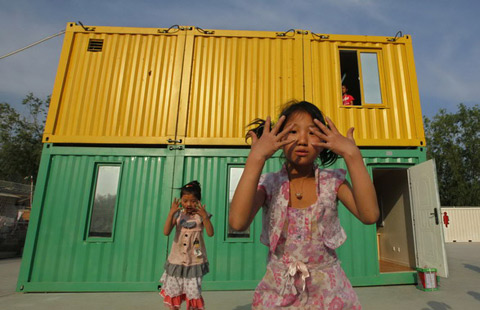Think services, inclusion and green
Updated: 2014-03-28 08:41
By Christine Lagarde (China Daily Europe)
|
|||||||||||
A few critical steps will ensure that china fulfills its amazing potential
Two defining features of today's new global economy are the rise of Asia and the power of interconnections.
Less than 50 years ago, the emerging markets and developing countries accounted for less than a quarter of global GDP. Today, it is half and rising rapidly, very likely to two-thirds within the next decade.
Asia, and China in particular, are key drivers of this astounding growth. And with their rise comes the remarkable growth of the global middle class and the rising aspirations of global citizens. In fact, some studies claim that the global middle class will exceed 5 billion people in 2030 - up from only 2 billion today.
Just as this new global economy will continue to expand, it will also continue to draw closer together.
Think of trade: not only has global volume grown exponentially, but so too have global supply chains, with more than half of total manufactured imports now "intermediate"; that is, made from components from different countries. As the manufacturing hub of the Asian supply chain, China is at the vanguard of this trade integration.
The same is true of financial flows. In the two decades before the crisis in 2008, global bank lending, as a share of world GDP, rose by 250 percent. As more countries, such as China, open up to the global economy, these financial flows will increase further, and will take different routes and pipes and channels. For instance, Internet banking is around the corner.
The power of interconnections is perhaps most visible in communications. Some call it the "hyper-connected world", and once again, it is driven in large part by Asia and other emerging economies. Today in China, for example, virtually everyone has a mobile device, and thus a potential connection to the Internet, and a potential connection to the world.

So a new and exciting future is being forged even as we speak - or perhaps I should say even as we tweet. It is a world of limitless opportunities and amazing potential. We are used to labels that say, "made in China". But this world is truly "made for China".
Then how can China make the most of this new world? By thinking services, thinking inclusion, thinking green.
First, think services. China's current growth model has made it the manufacturing hub for the world. But this can only take it so far. China must now take the next step, moving further up the value-added chain with a services sector driven by productivity and innovation. For this, a top-notch education system and a modern, globally integrated financial system will be key.
Certainly, China has made significant strides by investing in education and knowledge-based activities. The resources allocated to research and development have been raised to 2 percent of GDP - equal to that of many advanced economies. China now ranks first globally in terms of assessment in reading, mathematics and science.
Great progress; but to continue to nurture innovation, these investments must be sustained and expanded. They also need to be "internationalized" to benefit from greater collaboration and knowledge exchange across countries.
Innovation and enterprise also require a modern, resilient financial sector that can bring together savers and entrepreneurs to produce new jobs and incomes. China has vast savings and is already home to some of the largest banks in the world. Further measures to open up the financial system will turn them into global players.
And the future supervisors and regulators of this integrated financial system will need to ensure that these players abide by rules that safeguard financial stability, both domestic and global. That is a big lesson we all learned from the financial crisis.
Second, think inclusion. In many parts of the world, economic growth has come at the expense of rising inequality. China is no exception, disparities exist between coastal and inland areas, rural and urban regions, and even between the rich and poor within rural areas and cities.
Recent IMF studies have shown that unequal societies grow less, and when they do grow, growth is less sustainable. Inequality also erodes the social fabric. Improved education, healthcare and financial services can be powerful forces in overcoming inequality. The right kind of redistributive policies, such as progressive taxation and a strong safety net, can also help.
As Lao Tzu wisely said: "The most empowering way is to inspire people so that they become able to realize their own potential."
What about gender inequality? At 46 percent of its labor force, China's women are advancing at rates nearly as strong as its overall expansion. In Chinese companies, nearly 20 percent of CEOs are women, compared to only 4 percent of women in the Standard and Poor's 500 companies. So women in China are certainly making their mark. Yet it is important to remember that some women are still left behind. Many women in rural China, for example, are eking out a living while shouldering heavy domestic responsibilities. If China is to realize its nearly boundless potential, it must remove these obstacles.
Third, think green. China's tremendous strides in economic development have come with a heavy price tag - poor air quality, water shortages, and rising desertification. By 2030, China's cities will have added 350 million more people, more than the entire population of the United States today. Five million buildings will be built; 50,000 of these will be skyscrapers, the equivalent of 10 New York cities.
How is all this to be managed? The good news is that China has taken important steps to improve its environmental footprint, from spearheading innovation and implementation of renewable energy, to legislation to curb polluting industries. But as those who study, live, and breathe here in Beijing know only too well, there is still a long way to go.
"Each generation will reap what the former generation has sown," as a Chinese proverb says.
China has already established its leadership position in the global economy. As the country continues to grow, its global leadership will become even more important.
The author is managing director of the International Monetary Fund. This is an extract from her speech at Tsinghua University in Beijing on March 23. The views do not necessarily reflect those of China Daily.
(China Daily European Weekly 03/28/2014 page14)
Today's Top News
Partnership with Belgium, EU highlighted
Turkish PM wins local elections
Monday's search for MH 370 resumes: AMSA
Families of flight MH370 passengers 'need closure'
Greece passes new reform bill
Dobass demonstrators demand referendum
MH370 relatives demand answers
Turkey starts local elections
Hot Topics
Lunar probe , China growth forecasts, Emission rules get tougher, China seen through 'colored lens', International board,
Editor's Picks

|

|

|

|

|

|





